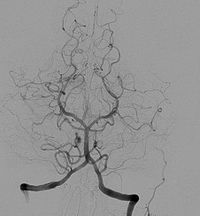
Photo from wikipedia
IntroductionTranscranial Doppler (TCD) of the middle cerebral artery (MCA) enables the measurement of the mean blood velocity (MCAVm) and the estimation of the cerebral blood flow (CBF), provided that no… Click to show full abstract
IntroductionTranscranial Doppler (TCD) of the middle cerebral artery (MCA) enables the measurement of the mean blood velocity (MCAVm) and the estimation of the cerebral blood flow (CBF), provided that no significant changes occur in the MCA diameter (MCADiam). Previous studies described a decrease in the MCAVm associated with the induction of total intravenous anesthesia (TIVA) by propofol and remifentanil. This decrease in blood velocity might be interpreted as a decrease in the CBF only where the MCADiam is not modified across TCD examinations.MethodsIn this observational study, we measured the MCADiam of 24 subjects (almost exclusively females) on digital subtraction angiography under awake and TIVA conditions.ResultsAcross the two phases, we observed a decrease in the mean arterial blood pressure (from 84 ± 9 to 71 ± 6 mmHg; p < 0.001) and heart rate (76 ± 10 vs. 65 ± 8 beats/min; p < 0.001), and a concomitant decrease in the MCAVm (61 vs. 42 cm/s; p < 0.001). In contrast, the MCADiam did not vary in association with TIVA (2.3 ± 0.2 vs. 2.3 ± 0.2 mm; p = 0.52).ConclusionsThose results suggested that in this population, no significant changes in the MCADiam are associated with TIVA.
Journal Title: Neurocritical Care
Year Published: 2019
Link to full text (if available)
Share on Social Media: Sign Up to like & get
recommendations!